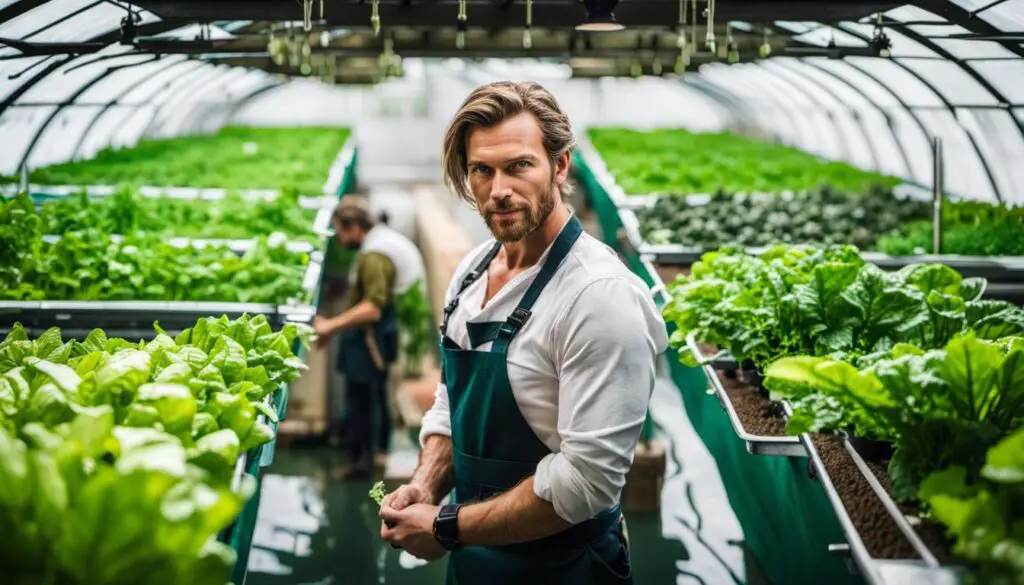Are you curious on how does aquaponics help the environment? Did you know that aquaponics saves water by recycling the same water multiple times, reducing waste? This blog post will explore the environmental, economic, and social gains made possible through this innovative farming practice.
Let’s dive into the world of sustainable agriculture to discover why aquaponics is a green thumb’s dream come true!
Key Takeaways
- Aquaponics conserves water by recycling it through a closed-loop system, reducing water wastage and making it ideal for regions facing water scarcity.
- Because aquaponics relies on nutrient – rich water instead of soil, it reduces the risk of soil contamination and eliminates the need for harmful pesticides, promoting organic food production and protecting the environment from chemical pollution.
- Aquaponics plays a crucial role in waste reduction by utilizing fish waste as a natural nutrient source for plants, creating a closed-loop environment with no waste being released into the environment. This promotes resource efficiency and supports sustainable farming practices.
Environmental Benefits of Aquaponics
Aquaponics offers several environmental benefits, including water conservation, soil-less cultivation, reduction of harmful chemicals, and waste reduction.
Water conservation
Aquaponics shines in its ability to conserve water, a critical resource. In traditional agriculture, substantial amounts of water are lost through soil absorption and evaporation, but aquaponics changes that.
It leverages the power of a closed-loop system, recycling the same H2O over and over again. This drastically reduces water wastage and makes it an exceptional tool for regions facing water scarcity.
The symbiotic relationship between plants and fish in this system optimizes efficient use of resources – the plant roots absorb excess nutrients from fish waste acting as a natural filter and clean up the water which is then recirculated back to the fish tank.
Aquaponics not only saves our precious liquid commodity but also promotes healthier plant growth with lesser inputs compared to conventional farming methods.
Soil-less cultivation
Soil-less cultivation is a key benefit of aquaponics. Instead of using traditional soil, this method relies on nutrient-rich water to nourish the plants. By eliminating the need for soil, aquaponics reduces the risk of soil contamination and ensures healthy plant growth in a contamination-free environment.
This innovative approach allows plants to thrive without relying on harmful pesticides, promoting organic food production and protecting the environment from chemical pollution. With its closed-system food production and integration with hydroponics, aquaponics demonstrates how sustainable farming practices can preserve soil health while maximizing plant purification and resource efficiency.
Soil-less cultivation in aquaponics also has practical advantages beyond environmental benefits. Since it doesn’t rely on traditional farming methods that require large plots of land, it can be implemented in limited spaces such as urban areas.
Aquaponic systems have a minimal footprint, making them suitable for both large-scale commercial operations or small backyard gardens. This versatility makes aquaponics an accessible solution for individuals and communities interested in sustainable agriculture practices that contribute to a circular economy and minimize greenhouse gas emissions.

Reduction of harmful chemicals
Aquaponics offers a solution to the problem of chemical pollution in agriculture. By eliminating the need for pesticides, aquaponic systems help reduce the release of harmful chemicals into the environment.
In traditional farming, pesticides are commonly used to protect plants from pests and diseases. However, these chemicals can contaminate soil, water sources, and even enter our food chain.
With aquaponics, the natural symbiotic relationship between fish and plants helps keep pests at bay without relying on harmful pesticides. This not only ensures contamination-free environments but also promotes healthier plant growth and food production that is free from chemical residues.
Waste reduction
Aquaponics plays a crucial role in waste reduction. In traditional farming methods, excess nutrients and chemicals from fertilizers can leach into the soil and contaminate water sources, causing pollution.
However, aquaponics eliminates the need for synthetic fertilizers altogether. Instead, it utilizes fish waste as a natural nutrient source for plants. Through this symbiotic relationship between fish and plants, the system creates a closed-loop environment where organic matter is efficiently utilized without any waste being released into the environment.
This not only reduces pollution but also promotes resource efficiency and supports sustainable farming practices.
Economic and Social Benefits of Aquaponics
Aquaponics offers numerous economic and social benefits. It provides a sustainable source of food production, ensuring local food security and reducing reliance on long-distance transportation.
Furthermore, aquaponics creates job opportunities and fosters community engagement. Discover more about these benefits in our blog!
Sustainable food production
Aquaponics is a sustainable and environmentally-friendly method of food production. It utilizes a closed-loop system where fish waste is used to fertilize plants, creating a symbiotic relationship between the two.
This eliminates the need for harmful chemical pesticides, reducing pollution in the environment. Aquaponics also conserves water by recycling it through the system multiple times, minimizing waste.
Additionally, this innovative farming technique can be implemented in limited spaces and has a minimal footprint, making it suitable for urban environments. By promoting resource efficiency and reducing water pollution, aquaponics plays an important role in sustainable food production practices.
Local food security

Aquaponics plays a crucial role in ensuring local food security. By implementing this sustainable farming method, communities can produce their own fresh and nutritious food year-round, regardless of external factors like weather or transportation issues.
Aquaponics utilizes a closed-loop system that maximizes resource efficiency and minimizes water usage, making it an ideal solution for urban areas with limited space. With aquaponics, communities can have access to a constant supply of locally grown fruits, vegetables, and fish, improving food security and reducing dependence on imports.
Job creation
Aquaponics not only benefits the environment but also creates job opportunities. As this innovative farming method gains popularity, more people are needed to design, build, and maintain aquaponic systems.
Additionally, since aquaponics requires both fish cultivation and plant growth, it opens up employment opportunities in both agriculture and aquaculture sectors. Furthermore, local communities can establish aquaponics farms to produce fresh food for their residents, leading to more jobs in food processing and distribution.
Overall, the implementation of aquaponics promotes economic growth by generating employment opportunities at various stages of the system’s operation.
Community engagement
Aquaponics promotes community engagement by providing opportunities for education and shared resources. Community members can participate in workshops and training programs to learn about sustainable farming practices and the benefits of aquaponics.
This not only empowers individuals to grow their own food but also fosters a sense of connection and collaboration within the community. Additionally, aquaponics systems can be set up in schools, community centers, or urban gardens, serving as educational tools that spark conversations about environmental stewardship and healthy eating habits.
These initiatives encourage active participation from community members, strengthening social ties and promoting a collective effort towards creating a more sustainable future.
Aquaponics and Climate Change
Aquaponics plays a crucial role in mitigating climate change by reducing carbon dioxide emissions and adapting to changing climate conditions.
Carbon footprint reduction
Aquaponics plays a crucial role in reducing our carbon footprint. By utilizing a closed-loop system, aquaponics minimizes the need for synthetic fertilizers and reduces greenhouse gas emissions.
This sustainable farming method promotes resource efficiency and contributes to mitigating climate change by utilizing fish waste as plant nutrients and creating a symbiotic relationship between fish and plants.
Aquaponics not only produces more food with less land, water, and labor but also helps create a cleaner and healthier environment for future generations.
Mitigating greenhouse gas emissions
Aquaponics plays a crucial role in mitigating greenhouse gas emissions. By utilizing a closed-loop system, it reduces the need for synthetic fertilizers and pesticides that contribute to carbon dioxide emissions.
Additionally, the plants in aquaponics systems absorb carbon dioxide through photosynthesis, helping to offset greenhouse gas levels in the atmosphere. As a result, aquaponics not only provides sustainable food production but also contributes to a healthier environment by reducing carbon footprints and promoting climate change mitigation efforts.
Adaptability to changing climate conditions
Aquaponics has shown remarkable adaptability to changing climate conditions. With its closed-loop system, it is less susceptible to extreme weather events such as droughts or floods compared to traditional farming methods.
The controlled environment of aquaponics allows for the regulation of temperature, humidity, and light, providing a stable and optimal growing environment for plants. This adaptability makes aquaponics a reliable and resilient method of food production in a changing climate.
By harnessing the power of symbiotic relationships between fish waste and plant growth, aquaponics offers an innovative solution that can thrive despite unpredictable environmental changes.
Preserving Water Resources and Ecosystems
Aquaponics helps to preserve water resources and ecosystems through its reduction of water usage, protection of rivers and lakes from fertilizer run-off, and preservation of aquatic habitats.
To discover more about the environmental benefits of aquaponics, keep reading!
Reduction of water usage
Aquaponics is a highly efficient system that helps to significantly reduce water usage. Unlike traditional farming methods, aquaponics recycles the same water over and over again, minimizing water waste.
The closed-loop system ensures that very little water is lost through evaporation or runoff, making it an ideal method for conserving this precious resource. In addition to saving water, aquaponics also eliminates the need for chemical fertilizers that can contaminate rivers and lakes.
This environmentally-friendly approach promotes resource efficiency and makes a positive impact on our ecosystems by preserving fresh water for future generations.
Protection of rivers and lakes from fertilizer run-off
Aquaponics plays a crucial role in protecting rivers and lakes from fertilizer run-off. Unlike traditional agriculture, aquaponics eliminates the need for chemical fertilizers altogether.
Instead, it utilizes fish waste as a natural source of nutrients for plant growth. This means that there is no risk of harmful chemicals seeping into nearby water bodies and causing contamination.
By preventing fertilizer run-off, aquaponics helps preserve the health of rivers and lakes, ensuring the protection of aquatic ecosystems and maintaining clean water sources for both humans and wildlife.
In addition to eliminating chemical pollution, aquaponics also contributes to reducing overall water usage. The closed-loop system used in aquaponics minimizes water loss through evaporation or drainage, making it highly efficient compared to conventional farming practices.
Preservation of aquatic habitats
Aquaponics plays a vital role in the preservation of aquatic habitats. By utilizing a closed-loop system, it minimizes water usage and reduces the risk of fertilizer run-off into rivers and lakes.
This helps protect these fragile ecosystems from contamination, ensuring the health and well-being of aquatic species. Aquaponics also promotes biodiversity conservation as it eliminates the need for harmful pesticides that can harm aquatic life.
In this way, aquaponics contributes to maintaining the delicate balance of our water resources and supports the sustainability of our environment.
Conclusion: How does aquaponics help the environment
In conclusion, aquaponics offers numerous environmental benefits that contribute to a healthier and sustainable future. By conserving water, reducing the use of harmful chemicals, and minimizing waste, aquaponics helps protect our ecosystems and preserves precious resources.
Furthermore, its integration with climate change mitigation efforts and promotion of local food security make it an essential tool in creating a more environmentally-friendly agricultural system.
Through aquaponics, we can cultivate food in a way that nourishes both our bodies and the planet.
FAQs
1. How does aquaponics help conserve water?
Aquaponics systems use up to 90% less water compared to traditional soil-based agriculture because the water is recycled and reused within the system, reducing overall water consumption.
2. Does aquaponics reduce the need for chemical fertilizers?
Yes, aquaponics eliminates the need for chemical fertilizers as fish waste provides natural nutrients for plant growth. This organic approach helps prevent pollution of soil and water with harmful chemicals.
3. What impact does aquaponics have on greenhouse gas emissions?
Aquaponics systems produce fewer greenhouse gas emissions compared to conventional farming methods due to reduced energy requirements for irrigation and transportation of crops, as well as decreased reliance on synthetic fertilizers.
4. How does aquaponics benefit biodiversity?
Aquaponic systems create a balanced ecosystem where fish and plants coexist, promoting biodiversity by providing habitat and food sources for various organisms. Additionally, it reduces pressure on wild fish populations by cultivating fish in a controlled environment rather than relying solely on fishing practices in nature.

As a dedicated mother and passionate software developer, she weaves her diverse experiences into captivating stories that inspire and engage readers. Emma's love for sustainable living and environmental consciousness permeates both her personal and professional life. When she's not immersed in the world of coding and software development, Emma can be found nurturing her family and tending to her thriving organic garden. Her commitment to sustainable practices extends to every aspect of her life, from repurposing household items to embracing eco-friendly technologies.










